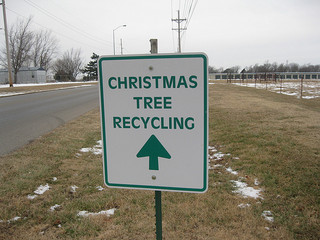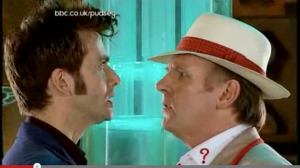Julie Duffy's Blog, page 186
December 25, 2012
[Writing Prompt] Seasonal Stories
Every year at this time I stumble on holiday-themed stories wherever I look: Christmas mysteries, Hannukah radio anthologies, contests themed on New Year’s. Collection after collection after anthology on seasonal stories. And why? Because they make great perennial gifts that publishers and authors can wheel out every year at the same time.

Of course, with the lead-time involved in publishing, if you want to have a hope of submitting a story to a themed anthology, you need to have it ready 6 months to a year before the occasion. So this is the perfect time to write.
The Prompt
Write a Themed Story For The Season
Tips
Pick Christmas, Hannukah, Kwanzaa, Winter Solstice, New Year’s or any other seasonal trope (“The First Snowman of Winter”?), whatever means the most to you.
Write it now and put a reminder in your online calendar telling yourself in June to start revising and submitting the story!
If you’re a self-publisher, plan to give the story away or release it annually
If you’re impatient and can’t imagine waiting a year to do something with a seasonal story, start writing your summer beach story or your Halloween spooky story now. (You’re probably cutting it fine for Valentine’s…)
Use all the stories you’ve accumulated in real life THIS holiday season to fuel your story: the good, the bad and the monumentally irritating!
The Rules:
1. You should use the prompt in your story.
2. You must write the story in one 24 hr period – the faster the better.
3. Post the story in the comments — if you’re brave enough.
4. Find something nice to say about someone else’s story and leave a comment. Everybody needs a little support!
Optional Extras:
Share this challenge on Twitter or Facebook
Some tweets/updates you might use:
This week’s #WriteOnWed short story prompt is very seasonal #storyaday http://storyaday.org/wow-seasonal
Come and write with us! #WriteOnWed #storyaday http://storyaday.org/wow-seasonal
See my story – and write your own, today: seasonal stories! #WriteOnWed #storyaday http://storyaday.org/wow-seasonal
Don’t miss my seasonal story #WriteOnWed #storyaday http://storyaday.org/wow-seasonal




December 24, 2012
[Tuesday Reading Room] Durak By Anatoly Belilovsky
 I found this story in Andromeda Spaceways Inflight Magazine and I loved it.
I found this story in Andromeda Spaceways Inflight Magazine and I loved it.
It’s a sci-fi story set on Earth, on the RMS Titanic, to be precise. How can that be a sci-fi/fantasy story? Well, you’ll have to read it to find out.
The story takes place exclusively around a card table on the luxury liner. Four men are playing Bridge and talking in a wide-ranging conversation as people do: they talk about where they’re from, what they’re thinking about, each one interjecting something that a man of his time, class and geographical identity might know something about.
The whole piece is beautifully crafted. Each character has a distinct voice and a careful use of dialogue tags keeps us straight in case there was any confusion.
Since we were talking about openings in last week’s Writing Prompt, I thought I’d quote from the opening of this story. It is very clever and repays the reader for a second reading. It promises one thing, delivers something different and then comes back and plays with us again, so we’re not quite sure where the writer is going.
“Is dangerous, this ice,” said the Russian.
The great frozen mass approached slowly, the steward struggling to push the cart across the threshold of the card room.
“I agree,” said the New Yorker. He shuffled a deck of cards, rather listlessly. “Looks like it’s about to give our steward here a hernia.”
“I only wanted enough to put in my brandy,” said the Texan. “Why’d he bring the whole block?”
“White Star line is very prideful of her service,” said the steward.
“They don’t do anything small on the Titanic,” the New Yorker said. “Not in first class, anyway.”
And then the story moves away from the ice and the Titanic and follows the mens’ conversation as they range all over history, philosophy, linguistics and fantasy. It’s a great discussion in itself, which keeps you reading. (I like stories where I feel like I’m learning something, or remembering something I once knew. I like stories that make me feel clever, don’t you?)
As the discussion continues, it subtly, subtly becomes clear that they are closing in on one topic, that is going to be the point of this story. The author uses repetition and comic relief in a really skillful way, to set up the eventual conclusion.
At the end of this story I sat back and said “Ha!” out loud, in an empty room.
I love it when that happens.
Durak
by Anatoly Belilovsky
published in Andromeda Spaceways Inflight Magazine No.54




December 19, 2012
[Writing Prompt] Write A Compelling Opening
Want to bore your readers and ensure they never get past your first paragraph? Write your opening as it were stage directions: describe a character or a room or the light or the hills…
YAWN!
It’s a familiar trap and we do it for a good reason — we’re trying to create an atmosphere or paint a picture in the reader’s head. The problem, from a reader’s perspective, is that we haven’t given them a reason to care about the pretty picture we’re painting.
One of the best pieces of advice I’ve seen to combat this problem is to start your scene as close to the action as possible (and by ‘action’ I mean ‘conflict’, and by ‘conflict’ I mean ‘the thing that’s going to torment/delight your character and therefore your reader, until the story is finished.)
How Quentin Tarantino Slapped Me in The Face

Buy this as a t-shirt at Threadless.com
Reservoir Dogs is a deeply unpleasant, unsettling movie, but when I went to see it in the theaters I came out stunned, not just by the gore, but also by the masterful storytelling. And it started right from the opening.
The opening scene takes place in a diner. No, there’s no ‘action’ in the scene but the conversation sets up all the characters (including a discussion about tipping). The meal is over, we’re entering the scene at the last possible minute, right before the interesting stuff happens and the characters reveal themselves. We feel that the characters existed, knew things, had lives, before we started to observe them.
Immediately after the credits, we jump to the interior of a car where, clearly, something has gone wrong. Mr Orange has been shot and Mr White and he are racing away from somewhere. Granted, Reservoir Dogs ‘cheats’ a little because the rest of the movie is told in flashbacks, but for our purposes, this scene illustrates my point. This scene could have started with the crime going wrong. It could have started with Mr Orange injured and being dragged to the car. But it doesn’t. They’re in the car. He’s sure he’s dying. Mr White appears to be helping him (quite tenderly, for a foul-mouthed criminal…). Horrifying as the scene is, you are fascinated. It’s hard to resist finding out what is going on.
And all because we walk in to the story when the action has already started. This is something we, as writers, need to do in our stories.
The Prompt
Write a heist story, but start it as late in the action as you possibly can.
Tips
You don’t have to go all Reservoir Dogs. You can write a gentle, comedy ‘heist’ where no-one is really in peril (a little old lady trying to make off with a pie from one of those rotating cases in a diner, armed only with a crochet hook…)
Try not to use ‘flashbacks’. Instead, start the scene when it’s getting interesting (when the crook is confronted? When the pursuit is in full flight?)
Make sure your readers know, early on, what’s at stake, and gradually unfold the reasons for your main character’s actions as the story goes on.
You can make the criminal sympathetic by giving them a good reason for attempting robbery, or you can make someone else the hero.
Keep putting obstacles in your protagonist’s way.
The Rules:
1. You should use the prompt in your story.
2. You must write the story in one 24 hr period – the faster the better.
3. Post the story in the comments — if you’re brave enough.
4. Find something nice to say about someone else’s story and leave a comment. Everybody needs a little support!
Optional Extras:
Share this challenge on Twitter or Facebook
Some tweets/updates you might use:
This week’s #WriteOnWed short story prompt is about openings #storyaday http://storyaday.org/wow-openings
Come and write with us! #WriteOnWed #storyaday http://storyaday.org/wow-openings
See my story – and write your own, today: openings! #WriteOnWed #storyaday http://storyaday.org/wow-openings
Don’t miss my heist story #WriteOnWed #storyaday http://storyaday.org/wow-openings




December 12, 2012
Treating Writing Like A Job
After four rounds of StoryADay, three NaNoWriMos and several decades of being in various stages of writerly success, avoidance, denial and productivity, I think I’m finally getting the hang of treating my writing as a job.
Pursuing The Craft
I’ve developed a three-pronged approach to this ‘course’ I’m taking in writing. I’m sharing it because if you aren’t doing all of these things, you will want to add them to your writing life. And because if I’ve missed something, I’d love you to share it in the comments.
Commitment
If you vow to write a certain amount every day, or at the same time every day, or to finishing a thing by a certain date, that’s commitment. You’re not just messing around. You’re practising your craft. Whether or not you start off each writing session in the mood, you write when you said you would. You’re taking it seriously.
That in itself is a big step.
But better than that, if you really writing, committing, finishing, you will be learning and improving and progressing towards a point where you can be proud of what you write.
Study
Learn from other writers.
This is a lesson I resisted for a long time. Let’s face it I don’t like to be told what to do. And in a way, it is dangerous to read about what other writers do, unless you read voraciously. Read, listen to podcasts and interviews, take it all in.
At first you’re going to get depressed because all the writers you love are doing it differently from how you do it. You’re going to try to write 2000 words a day, every day, like Stephen King or you’re going to think you can’t finish a book without a writer’s retreat in Taos, New Mexico. And then maybe you’ll find that your writing method is frighteningly close to that of that jackass writer whose books you wouldn’t read if they were the last words on earth.
But the more you listen, the more you’ll realize it doesn’t matter. You’ll find your own way and you can try out tips from other writers. Discard them if they don’t work. Hoard them if they do. And you’ll start to realize that all writers have slumps, all writers find the middle difficult, all writers think they’re writing garbage at some point in the first draft. And all the successful writers keep going anyway. They finish. They send their work out there. They move on and write the next thing.
Get Out There
Showing your work to your mother or your spouse is all very well (and a necessary stage to give you the courage to move on to the next bit). But a biased reader-review is nothing to the power of a review from another writer.
Get out into the world and find yourself some other writers. (Try Meetup.com for real-world writers groups in your area — I found an awesome group this way. Hang out in the Writer Unboxed community on Facebook, or at one of the billion other online communities (including this one!)
There is nothing like hanging out with other writers to help boost your confidence in your writing and in your decision to embrace this writing thing that pulls at you. Suddenly, you are not alone, and that feels great.
Even better, their feedback will come at you from a different angle. They won’t say your writing is ‘nice’ or ‘fine’. They’ll talk about character arcs and shading and plot archetypes, and you will learn from all the things they’ve read and learned as they study their craft.
—
How about you? Are you writing if and when the muse strikes or are you laying traps for her by writing every day, studying up on the craft and hanging out with other writers? What else are you doing to develop your writing career?




StoryADay Round Up For December 2012
So, were you furiously writing all through November? C’mon, I know you guys. You can’t resist a challenge and NaNoWriMo is the granddaddy of them all.
Well, if you were, I hope it went well. If you weren’t, well that just means you’ll have all the more creative energy for the inevitable New Year’s Resolution writing you’ll be doing in January!
What’s New At StoryADay.org?
The bonus StoryADay September went quite well, and I met some great new folks during it, but I think I’m probably going to go back to only hosting StoryADay during May from now on. I’d like to get us all together for a few events during the year (how about a Google Hangout short story slam? Or a weekend intensive?) so let me know what you’d like to see happening over at StoryADay.org when it’s not May.
A New Tool For You
It’s coming to the end of the year, so I put together a new tool to help you review your progress during the year and capture some ideas for next year. It’s the StoryADay “My Writing Year” quick planner and you can download a free copy here.
(It’s a worksheet for people who don’t like worksheets, and a list-maker for people who aren’t linear thinkers. I think you’ll like it!)
A Quick Thought On Revision
How do you approach revision? Do you go through the whole story at once and try to catch everything that’s not working, from line 1 to the final word? Or do you make several passes, starting with one aspect of the story and only then looking for others? Do you start with the copyedit or end with it?
If you’re having trouble getting to grips with the revision process it may be because your ‘process’ is a little too scattershot. If this sounds like you, stay tuned for a series of articles coming in the next month or two. I’ll be focusing on revision and a new, non-scary approach that’s going to make a lot of sense to you. So dig out a few old stories and get ready to polish them up with me.
Books For Your Holiday Wish Lists
I’ve read some great books this year and, since I know you all are sick of people buying you notebooks for whatever holiday you celebrate, I thought I’d share some of my favorites for you to add to your wish lists.
Books About Writing
Wired For Story by Lisa Cron
The Storytelling Animal by Jonathan Gottshall
Writing Fiction For All You’re Worth by James Scott Bell
Story Engineering by Larry Brooks (aimed at novelists but still a good overview of story structure)
The Icarus Deception by Seth Godin (pre-order)
Short Story Collections
This Is How You Lose Her by Junot Diaz
The Complete Stories by Grace Paley
The World’s Shortest Stories, Steve Moss, Ed.
The Best American Non-Required Reading 2011, Dave Eggars, Ed. (More than short stories, but don’t let that stop you)
(These are all Amazon Affliliate links and any purchases you make through them help support StoryADay.org. You are, of course, free to request these books from your favourite neighbourhood indie bookstore, chain or audio book purveyor)
Keep Writing
And that’s all I have for you this time. What ever else you do this month, make some time to write a story or two, won’t you? They don’t have to be long, but write something. If you do, tweet them, or link back to them from the Write On Wednesday posts at StoryADay.org and I promise I’ll come over and read them.
All the best,
Julie
P.S. Help Spread The Word?
Way back in 2001 & 2002, when I ran another writers’ website (The 21st Century Publishing Update), I was delighted to find that Writer’s Digest’s editors had listed it as one of their 101 Best Websites for Writers. Well, they’re taking nominations now for the 2013 list and I think our little writing hub here might fit, don’t you? If so, send your nomination of StoryADay.org along to Writers.Digest@fwmedia.com (put “101 Best Websites” in the subject line) as soon as possible. They’re deciding on the list now!
I’m not asking this for my own ego (though, seeing the site on the list WOULD be cool), but the more publicity we get, the more writers join and the more accountability, feedback and fun YOU get to have next May. Send that email now and tell them you’d like to see StoryADay.org included on their 101 Best Websites for Writers list. Thanks!!




December 11, 2012
[Writing Prompt] Wibbley-Wobbley, Timey-Wimey
I’m a sucker for a time-travel story. It might have something to do with growing up in the UK in the 1970s, where my generation was weaned on Doctor Who, but time travel in all its varieties works for me. Of course, there are lots of quibbles with time travel stories: can you really kill your own grandfather and cease to exist? If you step on a butterfly in prehistoric times will the future change (thank you, Mr. Bradbury)? And most perplexing, why do time travellers always seem to run into the important figures in history, rather than nobodies like you and I?
The Prompt
Write A Time Travel Story That Includes An Explanation Of Why Your Time Traveller Meets An Important Historical Figure
The Rules:
1. You should use the prompt in your story.
2. You must write the story in one 24 hr period – the faster the better.
3. Post the story in the comments — if you’re brave enough.
4. Find something nice to say about someone else’s story and leave a comment. Everybody needs a little support!
Optional Extras:
Share this challenge on Twitter or Facebook
Some tweets/updates you might use:
Don’t miss my time travel #WriteOnWed #storyaday http://storyaday.org/wow-wow-timeywimey
This week’s #WriteOnWed short story prompt is about time travel #storyaday http://storyaday.org/wow-timeywimey
Come and write with us! #WriteOnWed #storyaday http://storyaday.org/wow-timeywimey
See my story – and write your own, today: time travel!! #WriteOnWed #storyaday http://storyaday.org/wow-timeywimey




December 5, 2012
How Was Your Writing Year?
We all love the New Year: the retrospectives, the ‘where are they now’s, the ghoul pools, the feeling of starting afresh and of possibilities.
Well, the end of the year is nigh and it’s time to take a look at your writing life. And I have a printable worksheet to help you do just that.
Introducing The StoryADay.org “My Writing Year” Quick Planner
It’s a one-page, 8.5″x11″ printable form without any straight lines — perfect for those of us who like lists but aren’t linear.
(If you’re not using a US printer and paper, you’ll need to check the ‘resize to fit page’ box in your printer options, but it should work out OK.)
Take a few minutes to look back at what you’ve done this year. Spend a little time patting yourself on the back as well as taking note of opportunities missed, or where you could do better next year. Capture where you were and how far you’ve come. Scribble down a few plans for next year.
If you discover any surprising truths or want to share anything you put down, leave a comment here.




Why Write?
Seriously? Why tell stories?
No-one’s beating down your door to pay you money for your stories.
There are billions of people in this world. Why are your stories any better than theirs? Who’s going to listen?
You’re Asking The Wrong Questions
Humans are storytelling animals.
Imagination and emotion are what keep us from skating through life, forever on the surface, never going deeper and finding out what matters. Stories are all about imagination and emotion.
Why not write?
Isn’t that a better question?
The Storytelling Imperative
We tell stories every day.
All of us.
Even the people you wish wouldn’t.
You know the one, right? The one who starts to tell you about her journey in to wherever you are right now, but has to back up to tell you about what her husband asked her to cook before she left and how the car used to have heated seats but the mechanic messed it up and she’s still trying to get some satisfaction for that but she bets she never will…and you know there is something she is trying to tell you but now you’re standing there with your coffee gone cold and your boss’s increasingly frantic phone calls rerouting to voicemail, and still she doesn’t seem to be able to bring herself to the point of her story. And you can’t walk away because you know she’s building up to a point and you’re too well-bred to lean in and scream into her face, spittle flying, “Get to the freaking point, woman!”, so you stand there, following her down seemingly endless diversions and side roads hoping against hope that one of them will put her back on the road towards the point of her story.
And how do you know there is a point to her story? Because it’s how we communicate. You have a lifetime of experience in this stuff. You know that once someone has set a scene and introduced some characters (“Me, in my car, driving here”) they have entered into a contract with us to provide not just information but a story: something happens, some conclusion is reached, maybe there’s a moral, maybe not, but you both walk away having learned something.
The Contract
That’s the deal: I’m telling you a story. It will take you somewhere and give you something to take home with you at the end.
If you break the contract you are either a really bad storyteller and a bore, or you’re a comedian. (Think of why Steven Wright and Henny Youngman are so funny: they set up the expectation of a story and then subvert it. They aren’t wasting our time. They are entertaining us, so we forgive them.)
But back to your narratively-challenged office-mate. She didn’t just say, “Wow, it took me a long time to get here today.” She set the scene. She reeled you in. She has declared that she has a story to tell and you can’t help but stay to find out what happens in the end. (Unless, of course, you’ve heard her stories before.)
Why Write Stories?
If nothing else, to practice. To get better at it. To avoid being the person at a party or in the office corridors that everyone is scrambling to get away from.
By telling stories over and over again, in the safety of your notebook, you begin to see how story structure works: the set up, the missed opportunity, the payoff, the conclusion. You begin to learn how to make characters compelling (whether they are real or fictional). You learn how to pare back on the extraneous detail to keep your reader (or listener) interested.
By telling a lot of stories in a short amount of time, you learn these lessons quickly.
Don’t Wait
Dig in to the writing prompts and commit to writing a handful of stories this month. Then come back here and let us know you got on.




December 4, 2012
[Writing Prompt] The Journey
I’m always banging on about journeys: “the character needs to move from one state to another”, “writing is as much about the journey as the destination”…

“Journey” by Steve Loya
Well, enough with the metaphysical. Today we take a character and kick them to the kerb!
The Prompt
Your character takes a journey
Tips
It does have to be a literal journey.
It doesn’t have to be far.
But it can be.
It can also be metaphorical.
This will work best if they really, really want something and the journey is a part of that: promising reward or getting in the way of that ‘want’.
The Rules:
1. You should use the prompt in your story.
2. You must write the story in one 24 hr period – the faster the better.
3. Post the story in the comments — if you’re brave enough.
4. Find something nice to say about someone else’s story and leave a comment. Everybody needs a little support!
Optional Extras:
Share this challenge on Twitter or Facebook
Some tweets/updates you might use:
Don’t miss my story of a journey #WriteOnWed #storyaday http://storyaday.org/wow-journey
This week’s #WriteOnWed short story prompt is about a journey #storyaday http://storyaday.org/wow-journey
Come and write with us! #WriteOnWed #storyaday http://storyaday.org/wow-journey
See my story – and write your own, today: a journey!! #WriteOnWed #storyaday http://storyaday.org/wow-journey




November 15, 2012
[KABP] The Problem of Practice
The problem with telling people that you write is that they immediately ask unhelpful questions like “have you been published” or “when are we going to see that bestseller, then?” or “have you written anything I might have read?”
They mean to be supportive. They mean to show that they think it’s cool and exciting that you are a teller of tales. But the from the next-door and much-more-foul spawning ground that produces the inner editor, comes the inner critic, who stores up all these comments and replays them to you as criticism that you haven’t done enough fast enough and in who, in so doing, slams the brakes on all your progress. You know you’re not good enough yet, and these people, pushing you onto the stage before you’re ready, can cause a crippling case of stage fright. Don’t let them.
It’s All About Potential
As an adult if you tell people that you play piano or do gymnastics, they just raise their eyebrows and say ‘oh, that’s nice’ and assume it’s a harmless hobby that you do when you’re not doing your ‘real’ job. They might even envy you the time you somehow manage to carve out to keep up these interests.
When you’re a kid, though, tell anyone that you play an instrument or are working on the uneven bars and they immediately start asking you questions about when you’re going to play Carnegie Hall or how long until they see you in the Olympics. Of course, as a kid, all you really want to do is play a piece of music that’s got under your skin and experience the thrill of tumbling through the air. You know how to appreciate that moment when everything comes together and the practice starts to pay off. No kid ever grimly practices tumbles thinking ‘this is for Olympic glory’. Not until some grown-up goes and says the awful words, that is.
At the start of your journey other people see not the joy of creation, but practical potential. It’s a good thing. It’s a great thing. We should think ‘what if?’
-What if I took this seriously?
-What if I shared my stories and other people like them?
-What if I was wildly successful and one of those people in the top 5% of my field?
Wouldn’t that be cool?
Yes. It would. No doubt.
But what if you’re not there yet, not close?
Is it OK to keep practising?
Is it fair to take time away from family and friends to pursue your love of the written word?
Is it right to keep writing even you’re not publishing?
You betcha!
Much as no-one but a parent really wants to sit through a recital of piano classics played by incompetent seven year olds, and no-one but a coach can see the value in watching tiny children fall off the balance beam and dissolve into tears, no-one really wants to read your terrible, stumbling first attempts at stories, with their flat, croaking characters and their plotless meanderings.
But we still have to write them.
The only way to become better at writing is to write. The only way to write good stories is to write bad ones.
And there are, in fact, people out there who are willing, like parents at a recital and scouts at a gymnastics meet, to take your stumbling, fumbling duckling efforts and help you practice, and practice and practice until you become a graceful swan of a writer. They are called ‘your fellow writers’ and later, your editors. Seek them out. Befriend them. Be kind to each other.
And above all, keep writing.











